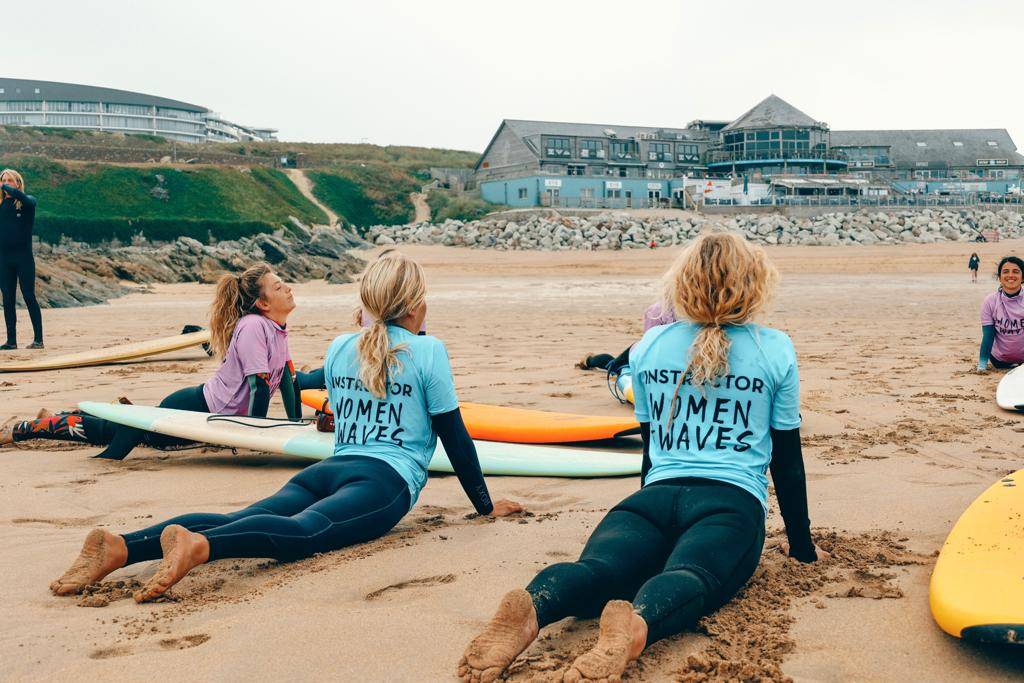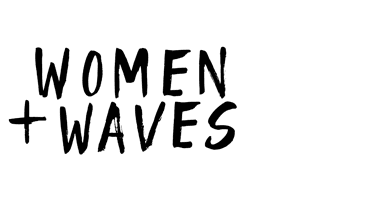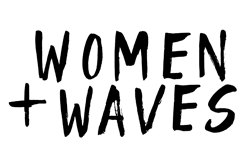
21 Jul How to become a surf instructor
By Carly Jones
Do you dream of spending your day at the beach, chasing the endless summer while teaching people a new skill they will carry with them for life?
Living life on the beach isn’t just for influencers or the rich and famous. If you’re looking to change your career or take a gap year while being able to fully enjoy the spoils of the great outdoors with an internationally recognised qualification, surf coaching could be your pathway into sun and sand-filled days in some of the world’s most incredible locations.
There are a few components to getting your surf instructor qualification and moving your workspace to the water, keep reading to dive in – this is the first step to your new dream life.

WHAT QUALIFICATIONS DO I NEED TO BECOME A SURF INSTRUCTOR?
- ISA Level 1 Surf Instructor qualification
This 2-day course covers theory and practical topics including surf safety, scenario training, coaching techniques, group management, providing fun and dynamic lesson plans, client and self-analysis, and bolstering your own confidence in the water.
You will also need a lifesaving qualification of which there are 2 to choose from:
- SLSBG Surf Coach Safety and Rescue Award
- RLSS National Vocational Beach Lifeguard Qualification
The Surf Coach Safety and Rescue Award in association withSurf Life Saving Great Britain (SLSGB) ensures you will be well prepared for life in the ocean. The courses cover first aid, fitness testing, performing board rescues and other rescue techniques based on the beach and surf environment.
If you want to take this a step further you can complete the RLSS National Vocational Beach Lifeguard Qualification. This requires extra physical capabilities, but if are interested in a career or part-time position as a beach lifeguard then you can go for this more intensive qualification. It involves an extra few hundred meters on your run-swim-run and slightly higher expectations for your surf rescues.
Although the NVBLQ is an excellent qualification to achieve, this is only necessary if you are interested in becoming a beach lifeguard. This assessment can be quite tough and will require most people to undertake prior swimming training to achieve the targeted time.
Pre-requisites:
SLSGB
- 200m pool swim in < 5 minutes
- 200m swim non-stop in open water, attacking the surf on entry
- 200m run in < 1 minute
- 400m rescue board paddle
NVBLQ
- 400m pool swim in < 8 minutes
- 25m pool swim followed by 25m underwater swim in < 50 seconds
- 400m swim non-stop in open water, attacking the surf on entry
- 200m run in < 1 minute
- Experience on board paddling + sea swimming
The final step to becoming a fully qualified surf instructor is to complete 20 shadow hours, this fully immerses you in your future career and allows for greater insight into the life of coaching as well as the ability to glean tips and tricks from established instructors. You can complete your shadow hours with any ISA recognised instructor and if you complete your course through Newquay Activity Centre (NAC) or Women + Waves (W+W) there is ample opportunity to get hands-on experience with our highly experienced and friendly team. NAC and W+W are also one of the only centres in Newquay that continue operations throughout the winter season so you can be fully qualified and ready to work in time for spring.
HOW TO BECOME A SURF INSTRUCTOR FAST?
We now offer an amazing opportunity to combine all of the elements above in one intensive course that gets you fully qualified and ready to teach surfing in only three weeks. Our Intensive Surf Instructor Course, in collaboration with Newquay Activity Centre, is unique in the industry. We support you every step of the way in your training to ensure you can become an awesome surfing instructor with our quality intensive course.

WHAT SKILLS DO I NEED TO BECOME A SURF INSTRUCTOR?
Contrary to popular belief you don’t need to be a child prodigy or eyeing up the pro circuit to become a qualified surf instructor. There is, however, an ISA requirement to show a level of proficiency on the waves and your personal experience will be evaluated as part of the course. In order to receive the final sign off for your qualification you will be assessed on the following points:
- Paddling
- Duck Dive or Turtle Roll
- Wave negotiation
- Take off on unbroken waves
- Bottom turns
- Backhand and forehand across that unbroken wave
- Exiting the wave over the back of the wave
- Getting back to shore safely and under control
Basically, you need to show that you can safely paddle out back into head-high surf, trim (turn) both left and right on green unbroken waves, and exit the wave safely (not letting your board go flying without you). A lot of people don’t realise that you do have time after the courses to get this practicality completed. The ISA gives you 12 months from the date of your course to provide documented evidence that you can meet the above standards and most assessors accept video footage of you in action.
Getting your fitness and body ready prior to taking on the course is a great idea if you are entering as a novice surfer, potentially look into hiring your own surf coach or check out videos for tips and tricks.
We spoke to 3X British National Champion and premier surf instructor Alan Stokes for his suggestions;
“Fast tracking your surfing can be achieved by practice and getting a friend to video you in action to see how you compare to the industry standard, video analysis is a great tool to help you and identify areas to improve. To get surf ready I’d also recommend working on your pop ups on dry land along with incorporating stretching and yoga into your training, this really primes the body for the movements involved in surfing proficiency.”
Aside from surf proficiency there are some other skills that are great to have if you really want to be successful as a coach, soft skills such as empathy, good communication, critical thinking, reliability and adaptability are cornerstones to ensuring your longevity within the industry and will assist in keeping you in good stead with potential employers.

WHAT TO EXPECT ONCE I AM QUALIFIED?
Surfing is one of the fastest growing sports globally, even becoming officially recognised as an Olympic sport in Tokyo in 2021! Holidaymakers are flocking to the coast wanting to try something new and surfing is accessible to all ages and abilities so good quality instructors are always in demand. You could also move to international waters but I recommend getting a season under your belt both for confidence and to beef up your CV. While being a surf coach isn’t always the highest paying position in the world there is potential to earn a decent wage while doing something you love. You can move up into higher levels of coaching such as your Level 2 or even start your own business. There are also plenty of avenues to explore to move up in the coaching world, think online coaching, youtube lesson delivery, or even becoming an assessor yourself. You can really make a career out of this line of work and, as with everything, you will get out what you put in. This is also the opportunity to really experience what it means to have a work/life balance and to chase summer across the globe.
WANT TO STEP UP YOUR TRAINING AND BECOME MULTI-FACETED?
If you really want to immerse yourself in the great outdoors and keep things interesting while also appealing to employers (or becoming self-employed), check out our Outdoor Activity Instructor Course, also in collaboration with Newquay Activity Centre. Over 3 months you can pull together qualifications including your ISA Level 1 Surf Instructor Award, British Canoeing Paddlesport Leader Award (this will allow you to guide kayak and SUP tours), a Beach Lifeguard Qualification and an award in Outdoor First Aid. Aside from these qualifications, you will also learn Bodyboarding with International Champion Rob Barber, Coasteering, Super SUP, foraging and bushcraft. You will also get to perfect your surfing skills with our good friend and British National Champion – the great Alan Stokes. The course pulls together so much that outdoor instructing has to offer, as well as providing more general industry knowledge including providing career pathways, processes for starting your own business, invoicing, forecasting, and planning and running fun and safe activities for your clients.
Whichever way you decide to go, you are already on your way to starting your new life, whether it is a complete 180 or a brief stopover before pursuing other activities, becoming an instructor is something you will take with you for the long run. Pulling together qualities that are transferable to many professions while spending your time enjoying life in the sun and learning more about our great oceans doesn’t sound like a bad way to spend your days.

If you are ready to change your life now is the time, check out our course dates below and secure your space, before you know it you will be living a life many dream about and enjoying the beach as your office.
Intensive Surf Instructor Training Course
Outdoor Activity Instructor Academy
You can also get in touch with any questions, drop us a line at info@womenandwavessociety.com



No Comments